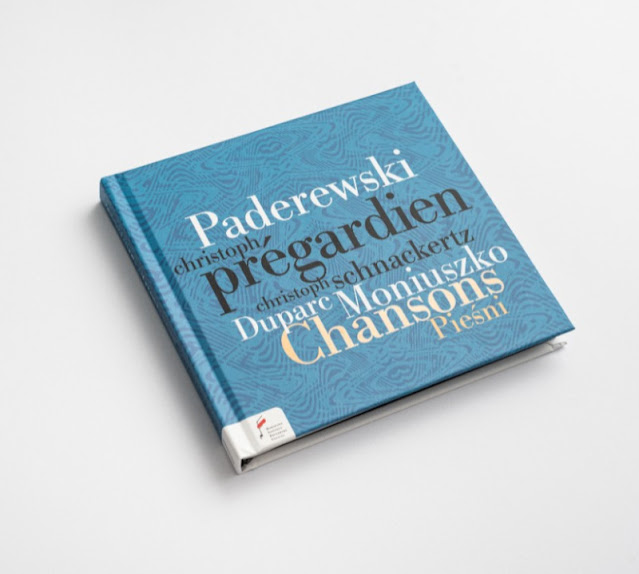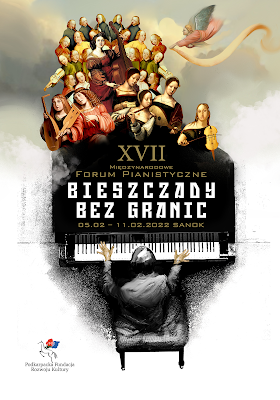Concert and recording review of Paderewski, Moniuszko, Duparc/ Songs - NIFCCD 070 - Christoph Prégardien tenor Christoph Schnackertz piano
17.08.19
17:00
Witold Lutosławski Studio of the Polish Radio
Vocal recital
Performers
Christoph Prégardien tenor
Christoph Schnackertz piano
Program
Stanisław Moniuszko (1819-1872)
Les larmes
Les plaintes de la jeune fille
Le chant de la tour
Le Nièmen
Henri Duparc (1848-1933)
Chanson triste
Soupir
Le manoir de Rosemonde
Phidylé
Robert Schumann (1810-1856)
Zwölf Gedichte, Op. 35 to words by Justinus Kerner
Concerts are never real music, you have to give up the idea of hearing in them all the most beautiful things of art.' Chopin said to one of his students (Chopin: Pianist and Teacher: As Seen by His Pupils Jean-Jacques Eigeldinger).
Far be it from me to contradict Chopin, but this was certainly not the case in the song recital I attended this evening. On this rarest of occasions, I had one of the deepest artistic experiences of my musical life. The renowned lyric tenor Christoph Prégardien sang with such subtlety and finesse the audience were reduced to utter stillness by the intense poetry of the performance and the meditative atmosphere this great artist created. His modesty and the deep seriousness of his approach was remarkable.
He began with a group of Moniuszko songs that were published in France in French translation as a result of efforts by Rossini and his publisher Flaxland, the negotiations conducted by Jozef Winiawski. The collection appeared in the autumn of 1862 under the title Echos de Pologne. Mélodies de Moniuszko, traduction française d'Alfred des Essarts. The translator Essarts (1811-1893) was an esteemed writer, poet, playwright and journalist. We heard a selection of these songs. Prégardien elevated these Moniuszko songs in French into the realm of high art and intense beauty.
As a perfectly gauged encore, also from the 'year of song', Prégardien softly addressed us as the civilized artist and gentleman that he is and sang from Liederkreis Op.39 with words by the Prussian poet Joseph von Eichendorff.
He began with a group of Moniuszko songs that were published in France in French translation as a result of efforts by Rossini and his publisher Flaxland, the negotiations conducted by Jozef Winiawski. The collection appeared in the autumn of 1862 under the title Echos de Pologne. Mélodies de Moniuszko, traduction française d'Alfred des Essarts. The translator Essarts (1811-1893) was an esteemed writer, poet, playwright and journalist. We heard a selection of these songs. Prégardien elevated these Moniuszko songs in French into the realm of high art and intense beauty.
This came as a surprise, I am sure, to a discriminating audience who was perhaps more accustomed to rather everyday and perfunctory performances of Moniuszko in Polish. I have begun to wonder if it is inferior performances of Moniuszko that have relegated him to an inferior position among composers. The composer has to be grateful also to Fabio Biondi and Europa Galante for a similar service to his art.
As this recital progressed I also became aware of the intense artistry and sensitivity of the piano accompanist Christoph Schnackertz. I have never heard an accompanist who is also a great artist except perhaps Geoffrey Parsons or Gerald Moore. His dynamic level rarely rose above mezzo-forte and the balance between voice and piano was almost miraculous. One tends to forget that the introduction and conclusion of art songs on the piano are an integral and organic part of the song itself, its spiritual and sensual life beginning and concluding. They are not brief throw-away gestures as they too often become. Schnackertz seemed to have achieved a symbiotic relationship with Prégardien. The effect of this extraordinary golden amalgam of artistic expression, one a perfect musical complement to the other in terms of phrasing, mood, nuance and feeling, was emotionally quite overwhelming.
In these gloriously sensitive, personal and sensual songs by Henri Duparc, the flexibilty of voice, the velvet timbre, the subtle dynamic range, the charm and romanticism of the French language of the set poems, carried one into an enchanted realm rarely occupied by performing artists. The impressionistic radiance and setting of L'invitation au voyage from Les fleurs du mal by Charles Baudelaire was superb. In Phidylé with words by Leconte de Lisle, the piano has an equal role in creating the atmosphere of yearning expectation. Schnackertz proved himself to be a truly great artist in the different but supportive and complementary piano part. Their partnership was effortless in congruent phrasing and dynamic. Magical.
When Prégardien dwelt on the word 'Toujours' in the setting of the poem Soupir (Sigh) by Prudhomme, your emotional reviewer was brought almost to tears by the pianissimo dying away of the word to a barely perceptible whisper with just the ghost of piano accompaniment. Toujours l’aimer. Toujours ! Almost unbearable beauty of sensibility.....
Soupir
Ne jamais la voir ni l’entendre,
Ne jamais tout haut la nommer,
Mais, fidèle, toujours l’attendre,
Toujours l’aimer !
Ouvrir les bras, et, las d’attendre,
Sur la néant les refermer !
Mais encor, toujours les lui tendre
Toujours l’aimer.
Ah! ne pouvoir que les lui tendre
Et dans les pleurs se consumer,
Mais ces pleurs toujours les répandre,
Toujours l’aimer…
Ne jamais la voir ni l’entendre,
Ne jamais tout haut la nommer,
Mais d’un amour toujours plus tendre
Toujours l’aimer. Toujours !
Sully Proudhomme (1839-1907)
Ne jamais la voir ni l’entendre,
Ne jamais tout haut la nommer,
Mais, fidèle, toujours l’attendre,
Toujours l’aimer !
Ouvrir les bras, et, las d’attendre,
Sur la néant les refermer !
Mais encor, toujours les lui tendre
Toujours l’aimer.
Ah! ne pouvoir que les lui tendre
Et dans les pleurs se consumer,
Mais ces pleurs toujours les répandre,
Toujours l’aimer…
Ne jamais la voir ni l’entendre,
Ne jamais tout haut la nommer,
Mais d’un amour toujours plus tendre
Toujours l’aimer. Toujours !
Sully Proudhomme (1839-1907)
After the interval, during which I simply remained slumped in my seat, not wishing to speak to anyone, we were given the eloquent Schumann Zwölf Gedichte, Op. 35 of 1840 to words by the poet Justinus Kerner. Here Schumann's love of Clara was always yearningly obvious as at the time he was waiting for the resolution of the legal battle with her father, Friedrich Wieck, so they could marry. In this famous 'year of song' he wrote almost 140 songs all referring openly or implicitly to Clara. They ranged over the notion of wandering, the worship of Nature ('Longing for Woodland' was Clara's favourite song), faithfulness, hidden feelings, friendship (here a wonderful sentiment in the title of the song 'To the wineglass of a departed friend'), loneliness and suffering.
As a perfectly gauged encore, also from the 'year of song', Prégardien softly addressed us as the civilized artist and gentleman that he is and sang from Liederkreis Op.39 with words by the Prussian poet Joseph von Eichendorff.
This was a recital devoted to the nature of emotional yearning and love in what must be considered a unique experience of the finest in performance art. I left the radio studio in a mood utterly disconnected from reality....
To purchase this CD which preserves the Moniuszko and Duparc song but replaces the Schumann I heard with a group of affecting songs by Paderewski :







Comments
Post a Comment